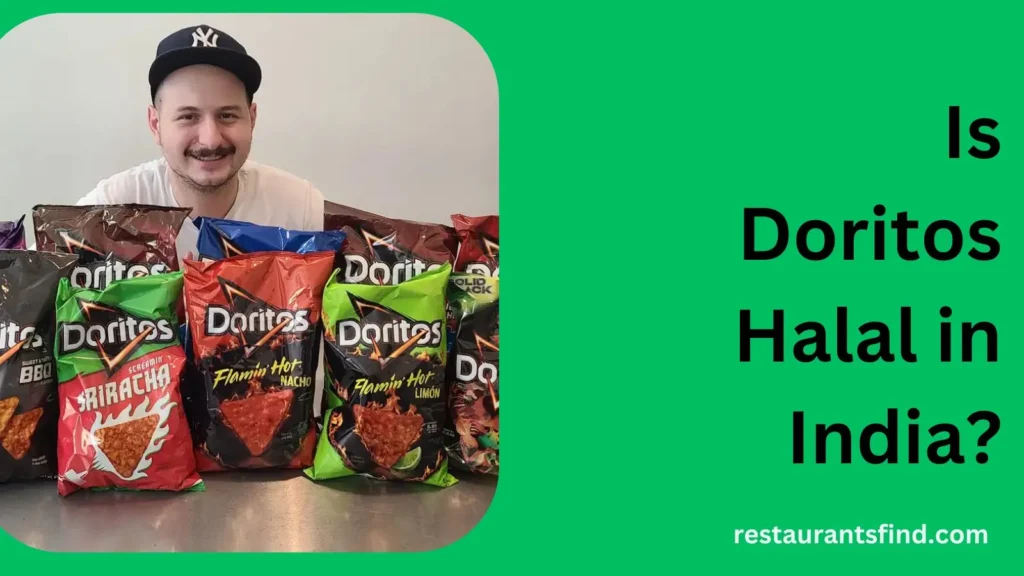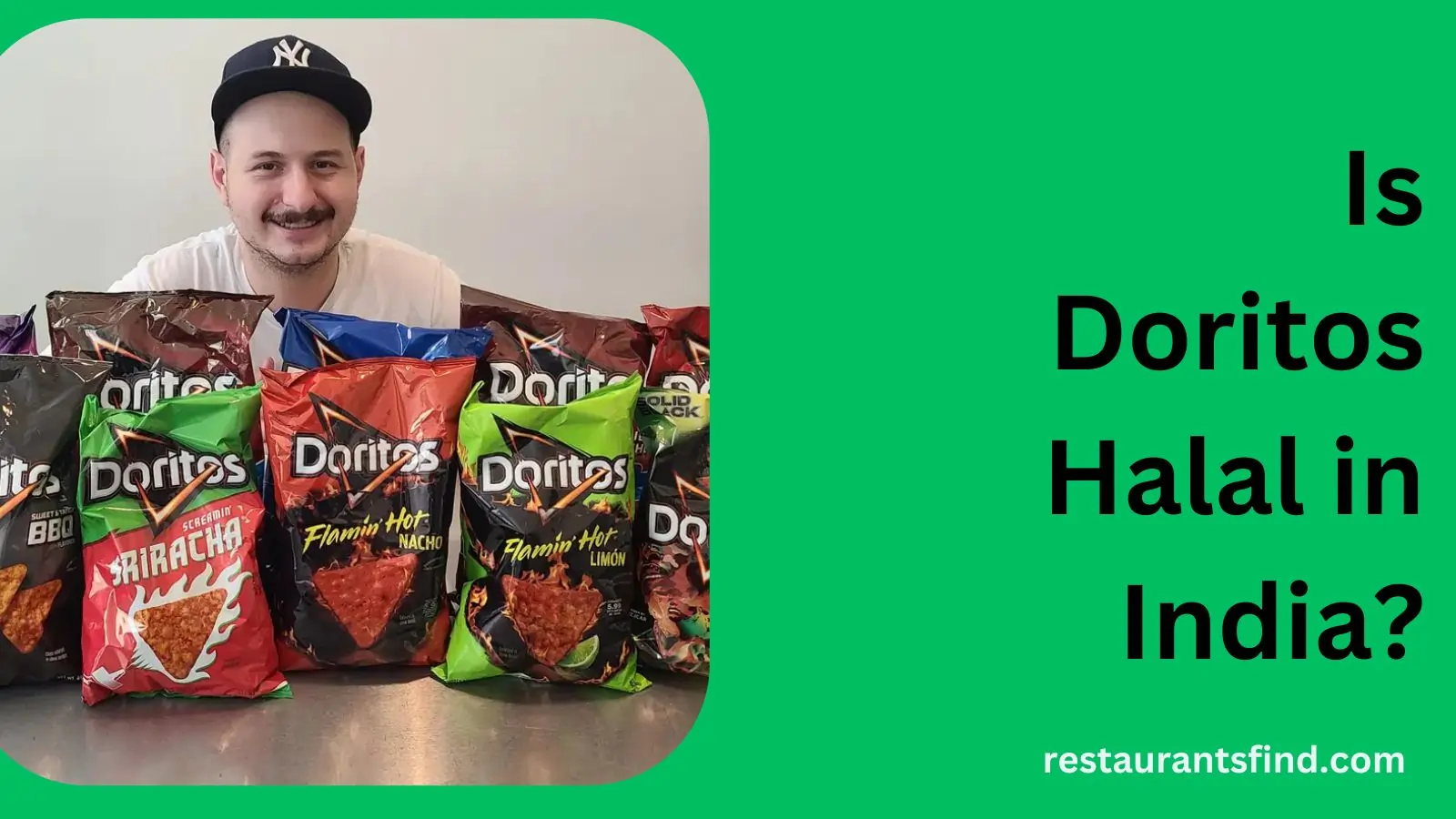Doritos, the popular flavored tortilla chips brand from the United States, has become a global snack sensation, including in India. With millions of Muslims in the country, questions about whether Doritos are halal have arisen.
In Islam, ‘halal’ means permissible, and it sets guidelines for what is allowed in dietary choices, avoiding ingredients like pork, alcohol, and non-Islamically slaughtered meat. In India’s diverse culture, where food plays a significant role, the concern about whether snacks like Doritos follow halal guidelines is crucial for Muslim consumers.

In this blog post, we will investigate whether Doritos are considered halal or haram in India. We’ll explore the factors influencing its halal compliance.
Is Doritos Halal in India?
Doritos contain several ingredients that may not be halal, making it difficult to determine whether they are suitable for consumption by those following Islamic dietary laws. Here’s a closer look at the key concerns:
1. Ingredients That May Not Be Halal
Common Ingredients in Doritos
- Doritos are primarily made from the following components:
- Corn (77%): The base of the chips.
- Edible Vegetable Oil (Palmolein Oil): Used for frying.
- Seasoning: A blend that may include:
- Maltodextrin: A polysaccharide used as a food additive.
- Spices & Condiments: Such as garlic powder, onion powder, chili, and spice extracts.
- Sugar: For sweetness.
- Iodized Salt: For flavor enhancement.
- Milk Solids: Including whey powder, cheese powder, and skimmed milk powder.
- Acidity Regulators: Such as citric acid (INS 330).
- Cheese: Adds a distinct flavor.
- Dehydrated Beetroot: For color.
- Yeast Extract: Flavor enhancer.
- Flavor Enhancers: Like disodium inosinate (E631) and disodium guanylate (E627).
- Color (124): Artificial coloring agent.
Potential Non-Halal Ingredients
- Certain ingredients in Doritos may raise concerns for those observing a halal diet:
- Cheese and Milk Solids: The production of cheese often involves rennet, an enzyme that can be derived from animal sources. If the rennet is sourced from animals not slaughtered according to Islamic law, it may not be considered halal.
- Flavor Enhancers (E631 – Disodium Inosinate): This additive can be derived from animal sources, including pork or non-halal slaughtered animals, making its halal status questionable.
2. Additives of Concern
- Flavor Enhancers: Some Doritos varieties contain flavor enhancers like monosodium glutamate (MSG). While MSG can be derived from plant or animal sources, its origin is not always disclosed, raising concerns about its halal status.
- Preservatives: Doritos use preservatives such as sodium diacetate, which may be derived from alcohol. Since alcohol is prohibited in Islam, this raises doubts about the product’s permissibility.
- Artificial Colors: Colors like Red 40, Yellow 5, and Yellow 6 are commonly used in Doritos. These may be problematic because:
- Some artificial colors are tested on animals.
- They might contain animal-derived ingredients.
- The sources of these colors are not always transparent.
3. Risk of Cross-Contamination
Another factor that can affect whether Doritos are halal is cross-contamination. This happens when Doritos come into contact with non-halal foods during manufacturing, storage, or transportation.
For example, if Doritos are produced in the same facility or on the same equipment as snacks containing pork or alcohol-based ingredients, there is a risk of cross-contamination, making them unsuitable for halal consumption.
4. Lack of Halal Certification
As of the latest available information, Doritos products in India are not halal-certified. PepsiCo India, which manufactures Doritos in Kolkata, West Bengal, has not obtained halal certification for these products. This lack of certification means there is no official assurance that all ingredients and manufacturing processes comply with halal standards.
Comparison with Other Countries
- United States and Canada: Many Doritos products in these regions contain cheese made with animal-derived rennet, and the products lack halal certification, making them unsuitable for those observing halal dietary laws.
- United Arab Emirates (UAE): In Muslim-majority countries like the UAE, food products, including Doritos, are often halal-certified to meet consumer expectations.
- United Kingdom (UK): Doritos UK has stated that their products are not halal-certified.
5. Uncertainty Around Flavorings
Doritos’ unique taste comes from various flavoring agents, which can also be a concern for halal consumers. These flavorings are classified into two types:
- Natural Flavor: Derived from plants or animals, but its halal status is uncertain. If it comes from a non-halal source, such as pork or alcohol, it would not be permissible in Islam.
- Artificial Flavor: Created in a lab using synthetic compounds. However, even artificial flavors can sometimes contain alcohol or other prohibited substances, making it difficult to determine their suitability.
To conclude, is Doritos halal in India? The clear answer to this question is no. Doritos is not considered halal in India or anywhere else; it is generally regarded as haram (not permissible) worldwide.
The presence of questionable ingredients like cheese (which may contain animal-derived rennet) and flavor enhancers like E631 (disodium inosinate)—which can be sourced from pork or non-halal animals—raises concerns about its permissibility.
Additionally, PepsiCo, the manufacturer of Doritos, has not officially confirmed halal compliance for its products in India or globally. In countries like the UK, USA, and Canada, Doritos is explicitly stated as non-halal due to the use of animal-based ingredients in certain flavors.
Therefore, for Muslim consumers who strictly follow halal dietary guidelines, Doritos is not a suitable option. It is generally regarded as haram (not permissible) worldwide, unless explicitly certified halal in specific regions like the UAE. To ensure compliance with halal standards, it is advisable to look for alternative snacks that carry verified halal certification.
Also Read: Is Barbeque Nation Halal? A Guide for Muslim Consumers
Conclusion
Doritos is not considered halal in India or anywhere else. The problem lies in its ingredients like cheese, meat, and additives, which may not follow halal guidelines.
There’s also the risk of cross-contamination during manufacturing and transportation, making it tricky. Importantly, Doritos lacks halal certification, meaning there’s no official proof it meets Islamic dietary standards. Even the flavors, whether natural or artificial, might have iffy halal status.
For Muslims aiming to stick to halal dietary rules, it’s better to skip Doritos. There are plenty of other snacks in the market that are halal-certified and taste just as good, if not better.
Always check labels for the halal logo or seal to be sure you’re making a halal choice and following your religious beliefs.
Muslims seeking halal snacks can explore alternatives. Brands like “Saffola,” “Bingo! Tedhe Medhe,” and “Haldiram’s” offer a variety of halal-certified snacks in India.
Checking for the halal logo on product labels ensures a choice that not only adheres to Islamic dietary guidelines but also caters to diverse taste preferences.
FAQs
1. Which Doritos are halal?
The base ingredients of Doritos—corn, vegetable oil, and salt—are generally halal. However, many flavors include additional components like cheese, enzymes, and natural flavors, which may be derived from non-halal animal sources. For instance, flavors such as Nacho Cheese and Cool Ranch contain cheese and natural flavors that could potentially include animal-derived ingredients, making their halal status questionable.
2. Is Doritos halal in India?
PepsiCo India manufactures Doritos in Kolkata, West Bengal. According to available information, Doritos products in India are not halal-certified. However, PepsiCo India has stated that the ingredients used in Doritos products in India are halal-suitable.
3. Are red Doritos halal?
The term “red Doritos” typically refers to the Nacho Cheese flavor. This flavor contains cheese and natural flavors, which may include animal-derived ingredients, making its halal status questionable.
4. Are purple Doritos halal?
“Purple Doritos” often refer to the Spicy Sweet Chili flavor. This particular flavor is generally considered halal, as it does not contain any animal-derived ingredients.
5. Are cheese Doritos halal?
Flavors like Nacho Cheese contain cheese and natural flavors, which may be derived from non-halal animal sources, making their halal status questionable.
6. Which Doritos are halal in the USA?
In the USA, most Doritos flavors are not halal-certified and may contain animal-derived ingredients. However, some flavors, such as Spicy Sweet Chili, do not contain animal-derived ingredients and are considered halal-friendly. It is essential to check the ingredient list and look for halal certification when available.
7. Is Doritos Flamin’ Hot halal?
The Flamin’ Hot flavor contains cheese and natural flavors, which may include animal-derived ingredients. Some sources suggest that Flamin’ Hot Doritos have been certified halal by specific organizations, but this information should be verified by the individual consumer.

